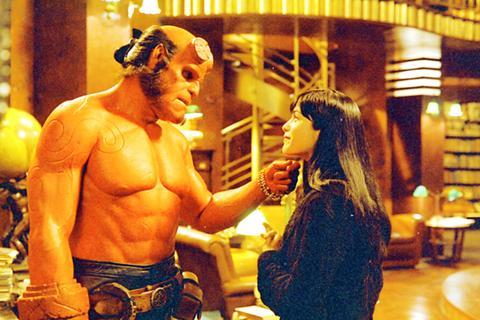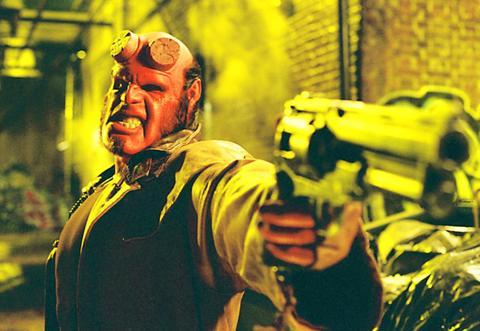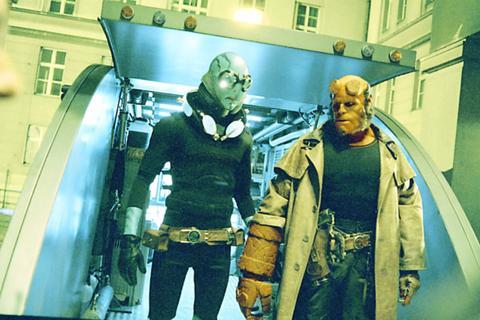Mike Mignola's Hellboy comics have a drizzly, musty gothic ambience -- the same fetid air that H. P. Lovecraft circulated in his fiction. The writer and director Guillermo del Toro has brought a similar woozy, disconcerting melancholy to his film adaptation, and his obvious affection and affinity for that dankness alone would make Hellboy worth seeing. But del Toro lets loose with an all-American, vaudevillian rambunctiousness that makes the movie daffy, loose and lovable.
For del Toro, this is hard-core. He turned down a shot at directing the third Harry Potter film because he nurtured a need to bring Mignola's colossal, monstrous-looking, Twizzler-colored champion to the screen. The director's determination pays off, mostly, as a dreamy mating of filmmaker, craft and material.
He also multiplied what Mignola (and John Byrne, who wrote the script of the comic series Seed of Destruction, from which the movie comes) envisioned by casting Ron Perlman in the lead, an actor whose unruffled, seedy dynamism gives Hellboy a raffish soulfulness.

Del Toro's concentration and visible love of the material and Perlman's witty and intuitive performance keep the movie afloat when the action sequences threaten to make it routine. Perlman enriches the film with emotional complication, giving Hellboy's vanity a piquancy. This devilish beast files down the horns on his head and has the swagger of a hipster mutant who takes pleasure in swatting down evil and exhaling plumes of smoke from a constant stream of cigars.
The story is pretty complicated. During World War II, Hitler, apparently anticipating story elements of Raiders of the Lost Ark, sends a special squad led by Grigori Rasputin (Karel Roden), the mad, mad monk, to rend the interdimensional barriers and obtain a creature that will give the edge to the Nazis. Given that the Nazis' black-magic squad has the unkillable Kroenen (Ladislav Beran) slicing through the Allies with a pair of gleaming retractable blades, you have to ask how much more of an edge does the Third Reich need? (If Hitler had access to just one of the superassassins assigned to him in the movies, we'd be living in a very different world today.)
Rasputin accomplishes his

otherworldly task with a whirling device that sends blue-white bolts through the countryside and also looks like the logo of one of the film's financiers, Revolution Studios. Rasputin's conjuring leads to the emergence of an infant creature, red as sin, with a long tail, who falls into the hands of the Allies. The kindly British scientist Dr Broom (John Hurt) tames the tiny scarlet devil with a Baby Ruth the size of a bazooka. Adopted by Dr Broom, Hellboy, with his huge, stonelike left arm, becomes the go-to guy for the good doctor and the antiapparition league known as the Bureau for Paranormal Research and Defense.
The movie shifts to the modern day, when that bureau is run by the snarling Tom Manning (Jeffrey Tambor), who's growing tired of coming up with lies to hide Hellboy's existence. He's charged with maintaining both Hellboy, who consumes mass quantities of food and beer, and the sensitive psychic Abe Sapien (Doug Jones), the water-dweller with the flesh of a trout (and a sonorous voice supplied by David Hyde Pierce). A new agent is assigned to baby-sit the pair, the nervous John Myers (Rupert Evans).
And when Rasputin and his ageless Nazi love, the she-wolf Ilsa (Bridget Hodson), let loose another dangerous force on the world, the lizardlike Sammael (Brian Steele), the situation requires the reactivation of a bureau agent, Liz (Selma Blair). Liz has pyro-telekinetic abilities she can barely control, not to mention another fiery-red power she cannot contain: Hellboy, whose crush on her is as mountainous as his appetite.

When Agent Myers, a mere mortal, gets into the middle of things, he seems to be a greater immediate threat than the immortal Sammael, who is reborn as two separate Sammaels every time he's killed. There's also a greater imminent threat: the destiny that Rasputin hints for Hellboy.
It's tough to bring a comic-book character to movie life because the incestuous homage that comics pay to one another is so prevalent. The ragtag group of unwanted, neurotic heroes feels like the X-Men, and the seat of evil that Rasputin and his team occupy has been seen in a thousand B pictures. Without the idiosyncratic boldness that the original artists convey on the page -- like Mignola's art, with its Expressionist woodcut cartoonishness -- comics-based movies often only echo what's come before in narrative terms.
What distinguishes Hellboy from the pack and gives it squirmy, ferocious life is the environment that del Toro creates on screen. The movie is lubricated with a fluid, slimy menace, and the director's love of rotted, desiccated flesh and exposed, traumatized organs adds an engrossing grossness. But a contrasting vulnerability has also been slipped in, a critical addition. When Abe Sapien goes off to investigate a Sammael appearance, there's a mounting awareness of how ill suited he is to an encounter with this slavering hybrid.

And the jealous Hellboy, stalking Myers and Liz on a date, vaults from rooftop to rooftop and ends up chatting about life and love with a 9-year-old boy from whom he filches cookies and milk. And when Manning and Hellboy's gruffness come nose to nose, the tension between them melts when Manning gives his charge a paternal and accurate lecture on how to light a cigar properly.
Del Toro avidly lavishes this texture on Hellboy, giving it a kiss of distinction. It's an elegant haunted house of a picture with dread and yearning part of the eeriness. Perlman's mastery of bad-tempered volubility makes Hellboy a kind of screwball-comedy version of the Thing from the Fantastic Four comics. Like any American comedy protagonist, he's always trying to explain himself and do what's right. That ambition is what gets him into trouble and is the truest definition of hell.

April 28 to May 4 During the Japanese colonial era, a city’s “first” high school typically served Japanese students, while Taiwanese attended the “second” high school. Only in Taichung was this reversed. That’s because when Taichung First High School opened its doors on May 1, 1915 to serve Taiwanese students who were previously barred from secondary education, it was the only high school in town. Former principal Hideo Azukisawa threatened to quit when the government in 1922 attempted to transfer the “first” designation to a new local high school for Japanese students, leading to this unusual situation. Prior to the Taichung First

The Ministry of Education last month proposed a nationwide ban on mobile devices in schools, aiming to curb concerns over student phone addiction. Under the revised regulation, which will take effect in August, teachers and schools will be required to collect mobile devices — including phones, laptops and wearables devices — for safekeeping during school hours, unless they are being used for educational purposes. For Chang Fong-ching (張鳳琴), the ban will have a positive impact. “It’s a good move,” says the professor in the department of

On April 17, Chinese Nationalist Party (KMT) Chairman Eric Chu (朱立倫) launched a bold campaign to revive and revitalize the KMT base by calling for an impromptu rally at the Taipei prosecutor’s offices to protest recent arrests of KMT recall campaigners over allegations of forgery and fraud involving signatures of dead voters. The protest had no time to apply for permits and was illegal, but that played into the sense of opposition grievance at alleged weaponization of the judiciary by the Democratic Progressive Party (DPP) to “annihilate” the opposition parties. Blamed for faltering recall campaigns and faced with a KMT chair

Article 2 of the Additional Articles of the Constitution of the Republic of China (中華民國憲法增修條文) stipulates that upon a vote of no confidence in the premier, the president can dissolve the legislature within 10 days. If the legislature is dissolved, a new legislative election must be held within 60 days, and the legislators’ terms will then be reckoned from that election. Two weeks ago Taipei Mayor Chiang Wan-an (蔣萬安) of the Chinese Nationalist Party (KMT) proposed that the legislature hold a vote of no confidence in the premier and dare the president to dissolve the legislature. The legislature is currently controlled